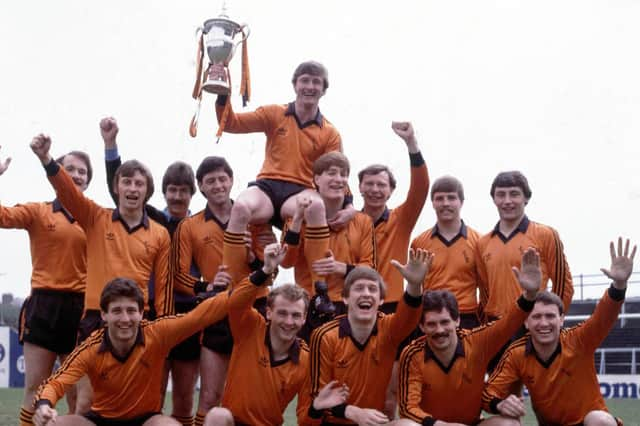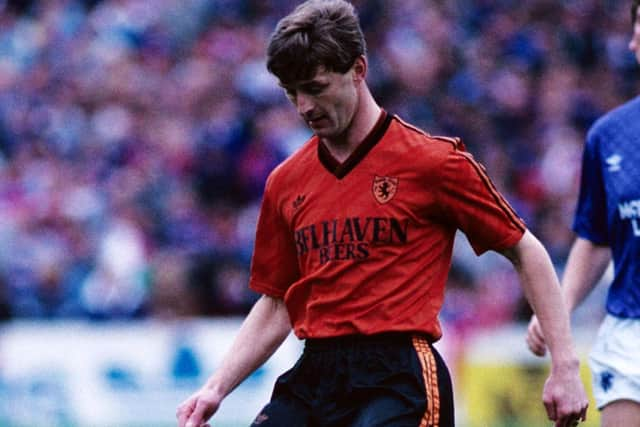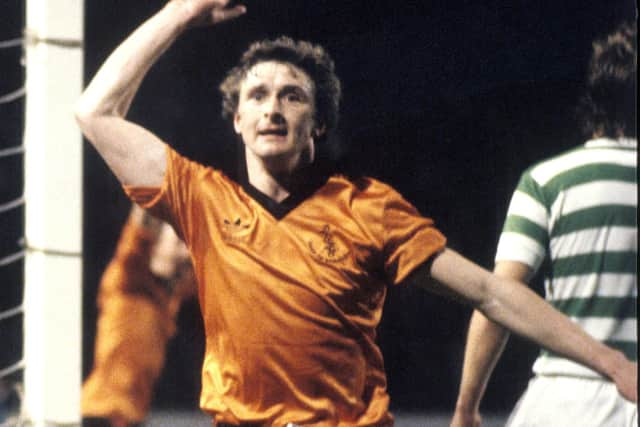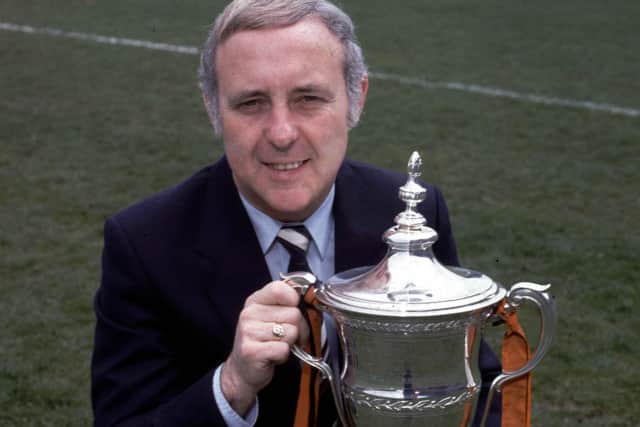How Dundee United won the league as Paul Hegarty recalls 'huge statement' against Celtic and Jim McLean fall-out


Now 68, he’s still immediately recognisable from a long way off at our designated meeting point in Broughty Ferry. All that seems different from his playing days is that David Narey isn’t standing there next to him, primed to sweep up the danger if required.
They will be reunited before long. As soon as this weekend, even.
Advertisement
Hide AdAdvertisement
Hide AdAn anniversary dinner in Dundee tonight celebrates the Dundee United Scottish title-winning heroes of 1983. It’s 40 years since that titanic…...2-2 draw with West Ham United in a mid-season friendly arranged after both sides had been knocked out of their national cup competitions. Eh?


The timing of these celebrations might be slightly skew-whiff but few are complaining.
“Fond memory brings the light...,” as Thomas More wrote. United have arranged a legends' day for today’s vital Premiership clash against St Johnstone. And why not? Who knows what the mood will be like when May 14, the actual anniversary, comes around? It will fall on the second weekend of the post-split fixtures.
Currently in peril at the bottom of the Premiership, United will this afternoon strive to feed off the good vibes created by the presence of club greats. The Tannadice club are tipping a hat to 1983 by reducing ticket prices to £19 for adults, £8 for concessions and £3 for children.
It's an imaginative, admirable gesture and the timing isn't as off-beam as might initially seem the case. After all, it's 40 years next week since a blessed frost fell across Glasgow, rendering the Parkhead pitch unplayable ahead of a game between the then leaders Celtic and United, behind them in third place. Who knows what might have happened had the game gone ahead?


The fixture was postponed as early as lunchtime. With the influential Narey an injury doubt, few in the United camp were complaining too loudly (Celtic had their own fears over Murdo MacLeod’s availability).
The game eventually went ahead on a midweek night in April. Despite losing Richard Gough to a red card, United won 3-2. "A huge statement," says Hegarty. They hit the top that weekend after a 4-0 win over Kilmarnock and were still at the summit three games later as Hegarty stole nervous glances towards the tunnel at Dens Park. United were holding onto a one-goal lead against their neighbours, which was all they needed to secure their maiden Scottish league title.
“You remember that old clock at Dens?” he asks. Yes, of course. “I was willing the hands forward. Hamish didn’t even know there was one there!” Hamish McAlpine, goalkeeper extraordinaire, is still going strong and recently turned 75.
Advertisement
Hide AdAdvertisement
Hide AdThe old clock at Dens Park is, however, no more. The old stadium itself seems to be living on borrowed time. How does that make Hegarty feel? Remarkably, the skipper won three major honours at the ground – the first three in Dundee United’s history.


"What I would say is that I was at a question-and-answers night about seven or eight months ago, and that question came up,” he says. “There were Dundee and Dundee United fans. Someone asked me. And my answer was not popular.
“My answer was why not have one ground? If it is good enough for AC Milan and Inter Milan, it’s surely good enough for Dundee and Dundee United. But convincing the Dundee and Dundee United fans is a different kettle of fish.
"What I do like about both clubs' stadium, they are quite earthy. They are not modern or fancy. Working class. They are where people go and enjoy the 90 minutes – or hopefully go and enjoy the 90 minutes..."
He's not a fan of Dundee's plans to vacate the famous street to head on their own to an edge-of-town site. "I wouldn’t like it...You don’t want to see history and places being demolished. What I would like is one stadium. Dundee’s history in one part, United’s in another part."
When, or indeed if, the wrecking ball swings at Dens, and given the significance of the stadium in his life, will Hegarty be in the hunt for a souvenir? Perhaps that patch of turf where Ralph Milne, god rest him, stood, arms aloft, having chipped Colin Kelly on that last day denouement 39 years and 279 days ago?
"Nah! I am not really that type of person! I am not a romantic. But you want Dundee to leave for the right reasons. If they feel it will be beneficial, they have to look after themselves. Good luck to them..."
*****
He wasn’t thinking this at around 4.39pm on 14 May, 1983, when United were on the cusp of making history. Understandably, they were getting jittery. Over ten months’ worth of work was on the line.
Advertisement
Hide AdAdvertisement
Hide Ad“We went to Scandinavia for a pre-season tournament,” recalls Hegarty. “Jim McLean had actually organised five games in six days there. That was a tall order. One game every three days now and folk are complaining. We played five in six days.
“There was a reason behind it. He wanted us to be tired come the end of the third game so that the fourth and fifth you had to dig deep even more for results. We only lost one game, and that was against Malmo – 3-1.
“After that week, we came back to Scotland and played Southampton at home, beat them 2-0 – Alan Ball and Kevin Keegan played. And then we played John Lyall’s West Ham, we had a good affiliation with them because of Ray Stewart. And we drew 3-3. That was the start of the 82-83 adventure.”
Hegarty is a compelling witness. Perhaps surprisingly given that he was renowned for his aerial ability, to the extent that his autobiography was entitled Heading for Glory, repeatedly connecting his noggin with an old leather ball has not dulled his senses. His recall seems razor sharp. He confesses to having genned up on some of the details because of his duties as a matchday host at Tannadice. Nevertheless, it’s impressive.
So often players are poor chroniclers of their own history. Hegarty relishes talking about this and other achievements of the Dundee United side he led with such distinction. He will address the fans from the pitch before kick-off today, with several of that great side, including McAlpine, Paul Sturrock, Maurice Malpas and John Holt, joining him on the park. Sadly for present day manager Liam Fox, they will not be wearing boots.
"The number of goals we scored that season (in all competitions)…I mean, we had 14 different players who scored goals. Ian Britton, Maurice Malpas, Derek Stark, Graeme Payne scored two each. Next, I think, was John Holt, who scored four, three of them in one game v Kilmarnock – left foot, right foot, header. I slipped in with five. Then you had John Reilly and Billy Kirkwood scoring seven goals each from midfield and then after that you had Richard Gough and Davie Narey, scoring nine goals each - a right back and centre back! And after that, Eamonn Bannon had 13 goals. Then Paul Sturrock on 16. And he was not even runner-up!
“Runner-up was Ralphie Milne with 21 goals, and then top goalscorer Davie Dodds on 28 goals. That equals 127 goals.
"John Clark, Derek Murray, Alex Taylor and Iain Phillip chipped in with performances. We had a reunion many years ago, maybe a decade afterwards, and I remember Alex Taylor saying, ‘Hegsy, we should not be here’. I was like: 'What do you mean?’ He replied: ‘We never played many games.’ I said, ‘Alex, whether you played one game or 36, you still got us there. We needed a player to perform that given day.'
Advertisement
Hide AdAdvertisement
Hide Ad“John Reilly is a prime example,” continues Hegarty. “He made something like eight starts and scored seven goals! What a return, eh! Are you taping this? Good!”
Hegarty is adamant that everyone should receive credit for a remarkable triumph, perhaps to offset some remarks made by manager Jim McLean, admittedly uttered in the elated aftermath of the triumph at Dens, that only 12 players had "achieved this tremendous success". The pool was small, but not that small. Noting this does not detract from the achievement, which, if anything, becomes more extraordinary with every passing (almost) anniversary.
United remain the last-but-one side to triumph in a competition otherwise dominated by Rangers and Celtic. Look again at the footage on Youtube of the last day win at Dens and study the sea of faces. How many will be slouching towards Tannadice this afternoon? If they were ten years old in 1983, they are now already 50 or soon to reach that milestone.
Details, such as Hegarty replacing the injured McAlpine in goal at Cappielow shortly after half time in the third last game, will only remain in living memory for so long. He shrugs when asked about this cameo between the sticks. He thinks he made a few saves but credits his teammates for establishing the three-goal lead that meant he was under less pressure than might have been the case (United eventually beat Morton 4-0).
"It’s your job, isn’t it?” Hegarty says, modestly. Not really – you’re a centre half! “How many clean sheets in Hamish's career do you think he had?" he asks, quickly deflecting praise elsewhere. "That's 677 games." Around 100? "240. One every two-and-a-half games.”
"People say he is a joker," he continues. "See when it came to the serious stuff, he was bang on the money."
Mention of McAlpine brings us to Billy Thomson, whose death at just 64 has cast such a pall over Tannadice and elsewhere since it was announced nearly a fortnight ago. While not a member of the ‘83 squad, Thomson joined the following year and became an integral member of the side that reached the 1987 Uefa Cup final. Hegarty has been badly affected by Thomson's death.
"If you wanted anyone to take over from Hamish, Billy was your man," he says, eyes moistening. "Two very different characters, Billy had a dry sense of humour. Good fun. Like Hamish, a really good trainer, as most goalies are. But they were two very different goalkeepers. Hamish knew cross balls were not his forte. He allowed Goughie, myself and Davie Narey to deal with that.
Advertisement
Hide AdAdvertisement
Hide Ad"It was a tough one to crack replacing him. And Billy came along and did that with considerable ease. He was completely different to Hamish with regards to cross balls. He would come out 12, 15 yards. And if you did not clear the area, you could get a dull one from big Tommo - and I got a few!
"But I was delighted he had come for it and the ball was not in the net. That would give the back four and the team in general a lot of confidence. Like Hamish, he was a great shot stopper. And.... a lovely human being. It is just so sad.”
This weekend will be the first official reunion of the title-winning side since Jim McLean’s death on Boxing Day in 2020 and the first since his assistant, Walter Smith, passed away the following year.
Both will be uppermost in people's thoughts. In the case of McLean, not only because of the statue that now stands on a plinth near the main entrance to Tannadice. Smile, the well-received, two-hander play about McLean, with Barrie Hunter playing the late, legendary manager, begins another run at the Dundee Rep tonight.
"We actually had a question and answers session the night we went," recalls Hegarty. "All the players on stage. It was like a therapy session!"
The relationship between McLean and Hegarty was one of the most fascinating manager-skipper dynamics in all of football. Despite the success they shared, and Hegarty regularly insisting that he owes everything he did in football to McLean, they struggled to reach an accommodation with one another during United’s heyday.
Hegarty makes a perceptive comparison to the relationship between Alex Ferguson and Roy Keane at Manchester United. There was respect, sure, but there was a mutual wariness, with things eventually curdling and souring to the extent that McLean told Hegarty he was finished at the club after a below par display in the 4-0 defeat to Royal Antwerp in the Uefa Cup, in October 1989. He joined St Johnstone that January.
"They had just moved to McDiarmid and were trying to get into the top division,” recalls Hegarty. “Alex (Totten) and Bert Paton were brilliant with me. A breath of fresh air. I left under a cloud at United.
Advertisement
Hide AdAdvertisement
Hide Ad"After that Antwerp game, the manager very publicly said in front of everyone, 'You will never kick a ball for this club again!' He said I flogged two goals. Which wasn’t true on my part. I lost one goal. We lost heavily. He said I’d never play again. And I didn’t.
"I went to see him about three weeks later. I was still training with the first team. I said I needed to play. He said that’s not going to happen. I still had six months on my contract to go. Eventually he told me a club was in for me, and I could speak to them."
Hegarty contributed to St Johnstone's memorable promotion season at their new ground. "I only played 15 games, sometimes I did not play particularly well, but the experience gets you through. I think we won 11 of the games."
And McLean? "He probably thought later on it was too harsh. But that was the way he was. He was harsh with everyone. He wasn't just harsh with Paul Hegarty. I just thought that, after 707 games, I deserved a bit more… leeway.”
Hegarty, who was kept out of the loop when Spurs made moves to sign him in 1979, deserved that at least, something McLean acknowledged later.
“He was a hard, hard taskmaster," continues Hegarty. "I actually said to him after my career was over and went back: 'Do you realise the boys you had at the time were all really brilliant boys?' He replied: 'Oh, I know that Paul, but it is too late. It's too late.'"
Comments
Want to join the conversation? Please or to comment on this article.